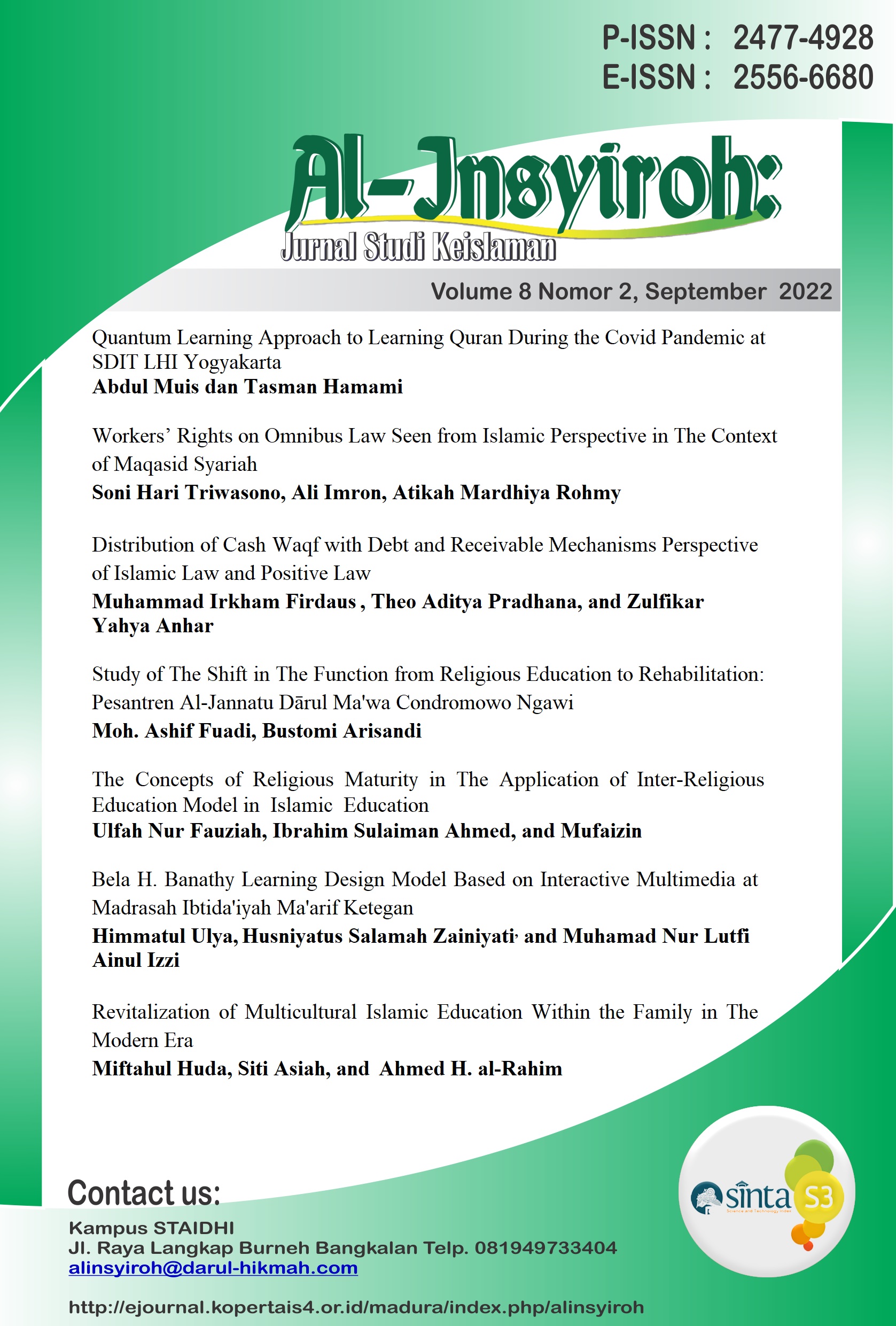The Concepts of Religious Maturity in The Application of Inter-Religious Education Model in Islamic Education
DOI:
https://doi.org/10.35309/alinsyiroh.v8i2.5878Keywords:
Religious Maturity, Islamic Religious Education, Interreligious Education, ToleranceAbstract
This study aims to analyze the interreligious education model in Islamic religious education and identify the concept of religious maturity in the application of the interreligious education model in Islamic religious education. This article was written using a qualitative approach and library research. Sources of data are taken from various library sources in the form of journals, books, theses, reports and so on that have relevance to the target object in this study, the researcher then process the data, until finally making the final conclusions from the research results. Overall, the results of the analysis show that the interreligious education model is able to produce characteristics and values in the concept of religious maturity of students, including: 1) tolerance; 2) dynamic; 3) integral; 4) critical; and 5) love. Thus, educators who apply the interreligious education model are actually supporting the process of religious maturity of students. The results of this study are expected to be used as reference material for educators, especially in the subject area of Islamic Religious Education, to be able to dare to open their eyes to the diversity of religions that will be faced by their students in the future, so that efforts are made to apply an interreligious education model which of course remains constant implemented in the corridor of Islamic law.References
Abu-Nimer, Mohammed. “Conflict Resolution, Culture, and Religion: Toward a Training Model of Interreligious Peacebuilding.†Journal of Peace Research 38, no. 6 (2001): 685–704.
Ali, Nur, Benny Afwadzi, Irwan Abdullah, and Muhammad Islahul Mukmin. “Interreligious Literacy Learning as a Counter-Radicalization Method: A New Trend among Institutions of Islamic Higher Education in Indonesia.†Islam and Christian-Muslim Relations 32, no. 4 (2021): 383–405.
Arif, Mahmud. “Pendidikan Agama Islam Inklusifmultikultural.†Jurnal Pendidikan Islam 1, no. 1 (2012): 1–18. Accessed January 13, 2022. http://ejournal.uin-suka.ac.id/tarbiyah/index.php/JPI/article/view/1110.
Baidhawy, Zakiyuddin. “Pendidikan Agama Islam Untuk Mempromosikan Perdamaian Dalam Masyarakat Plural.†Analisis: Jurnal Studi Keislaman 14, no. 2 (2014): 289–309. Accessed January 13, 2022. http://ejournal.radenintan.ac.id/index.php/analisis/article/view/690.
Berling, Judith. “Finding Our Way: Issues and Challenges in Interreligious Teaching and Learning.†Teaching Theology and Religion 23, no. 1 (2020): 4–16.
Frianty, Risma, and Ema Yudiani. “Hubungan Antara Kematangan Beragama Dengan Strategi Coping Pada Santriwati Di Pondok Pesantren Tahfidz Putri Al-Lathifiyyah Palembang.†Psikis: Jurnal Psikologi Islami 1, no. 1 (2016): 59–70. Accessed January 9, 2022. http://jurnal.radenfatah.ac.id/index.php/psikis/article/view/557.
Hafidzi, Anwar. “Konsep Toleransi Dan Kematangan Agama Dalam Konflik Beragama Di Masyarakat Indonesia.†Potret Pemikiran 23, no. 2 (2019): 51–61. Accessed January 9, 2022. http://journal.iain-manado.ac.id/index.php/PP/article/view/1003.
Harahap, Nursapia. “Penelitian Kepustakaan.†Jurnal Iqra’ 08, no. 01 (2014): 68–73.
Hariyadi, Muhammad, and Imronuddin Imronuddin. “Karateristik Pendidikan Inter-Religius Dalam Al-Qur’an.†Kordinat: Jurnal Komunikasi antar Perguruan Tinggi Agama Islam 20, no. 1 (2021): 127–146. Accessed January 13, 2022. http://journal.uinjkt.ac.id/index.php/kordinat/article/view/20649.
Hidayah, Lanti Nurul. “Upaya Menumbuhkan Kematangan Beragama Melalui Bimbingan Keagamaan (Studi Kasus Pada Wanita Pelaku Konversi Agama Di Jomblang Dukuhwringin Slawi Tegal).†Universitas Islam Negeri Walisongo Semarang, 2020. Accessed January 9, 2022. http://eprints.walisongo.ac.id/12811/.
Ilhami, Hablun. “Kematangan Beragama Jalaluddin Rumi Ditinjau Dari Prespektif W. James.†YASIN : Jurnal Pendidikan dan Sosial Budaya 1, no. 1 (2021): 96–107. Accessed January 9, 2022. https://ejournal.yasin-alsys.org/index.php/yasin/article/view/19.
Iqbal, Mahathir Muhammad. “Pendidikan Multikultural Interreligius: Upaya Menyemai Perdamaian Dalam Heterogenitas Agama Perspektif Indonesia.†SOSIO DIDAKTIKA: Social Science Education Journal 1, no. 1 (2014): 89–98. Accessed January 13, 2022. http://journal.uinjkt.ac.id/index.php/SOSIO-FITK/article/view/1209.
Kanas, Agnieszka, Peer Scheepers, and Carl Sterkens. “Interreligious Contact, Perceived Group Threat, and Perceived Discrimination: Predicting Negative Attitudes among Religious Minorities and Majorities in Indonesia.†Social Psychology Quarterly 78, no. 2 (2015): 102–126.
Kirana, Zuyyina Candra. “Pendidikan Interreligius Berbasis Pancasila Sebagai Acuan Melawan Stigma Menguatnya Radikalisme.†MOMENTUM : Jurnal Sosial dan Keagamaan 9, no. 1 (2020): 150–169. Accessed January 13, 2022. https://scholar.archive.org/work/h3ji4kxpprburku3elo7wmtmcq/access/wayback/https://ejournal.stib.ac.id/index.php/mmt/article/download/82/69.
Nurkholis, Nurkholis. “Pendidikan Dalam Upaya Memajukan Teknologi.†Jurnal Kependidikan 1, no. 1 (2013): 24–44.
Rahmat, Munawar. “Model Perkuliahan Pendidikan Agama Islam Yang Damai, Moderat, Dan Toleran.†Nadwa: Jurnal Pendidikan Islam 12, no. 1 (2018): 39–64. Accessed January 13, 2022. https://www.researchgate.net/profile/Munawar-Rahmat/publication/325899390_Model_Perkuliahan_Pendidikan_Agama_Islam_Yang_Damai_Moderat_dan_Toleran/links/5b4fae89a6fdcc8dae2b3fb9/Model-Perkuliahan-Pendidikan-Agama-Islam-Yang-Damai-Moderat-dan-Toleran.pdf.
Ramdhan, T. W. (2019). Desain Kurikulum pendidikan Islam berbasis tauhid. Al-Insyiroh: Jurnal Studi Keislaman, 5(1), 118-134.
Ramdhan, T. W. (2018). Dimensi Moderasi Islam. Al-Insyiroh: Jurnal Studi Keislaman, 2(2), 29-48.
Sabiq, Ahmad Fikri. “Hubungan Antara Kematangan Beragama Dan Kematangan Kepribadian Dengan Sikap Toleran Pada Guru SD PTQ Annida Salatiga Tahun 2020.†Institut Agama Islam Negeri (IAIN) Salatiga, 2020. Accessed January 9, 2022. http://e-repository.perpus.iainsalatiga.ac.id/8047/.
Salamah, Diah Ummu. “Hubungan Antara Kematangan Beragama Pada Remaja Dan Pendidikan Agama Islam Dalam Keluarga Dengan Hasil Belajar Dalam Mata Pelajaran Agama Islam Di Sekolah.†Universitas Muhammadiyah Surakarta, 2012. Accessed January 9, 2022. http://eprints.ums.ac.id/id/eprint/18730.
Tafsir, A. “Kajian Pendidikan Islam Di Indonesia.†In Cakrawala Pemikiran Pendidikan Islam, edited by Tedi Priatna, 1–43. 1st ed. Bandung: Mimbar Pustaka: Media Transformasi Pengetahuan, 2004.
Wahyuni, Ida Windi. “Hubungan Kematangan Beragama Dengan Konsep Diri.†Al-Hikmah: Jurnal Agama dan Ilmu Pengetahuan 8, no. 1 (2011): 1–8. Accessed January 9, 2022. https://journal.uir.ac.id/index.php/alhikmah/article/view/1532.
Yusuf, Munir. Pengantar Ilmu Pendidikan. Edited by Dodi Ilham. 1st ed. Palopo: Lembaga Penerbit Kampus IAIN Palopo, 2018.
Downloads
Published
How to Cite
Issue
Section
License
Copyright (c) 2022 Al-Insyiroh: Jurnal Studi Keislaman

This work is licensed under a Creative Commons Attribution-ShareAlike 4.0 International License.

This work is licensed under a Creative Commons Attribution-ShareAlike 4.0 International License.









